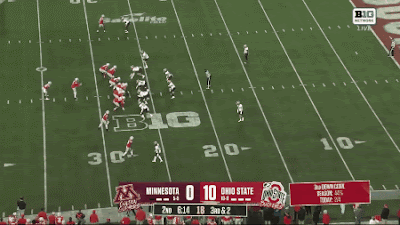In 1919, one of the most important figures in the early development of football, Walter Camp, made a salient point: Naming a college football national champion is foolish.
In a season of shocking upsets and great parity, in which only Texas A&M finished perfect as the 10-0-0 champions of the Southwest Conference, every corner of the country experienced wild races just to prove who was just the best team in their region and to hold bragging rights over each other. Per Camp: "Every team which won its game over the traditional rival, readily forgot the defeats at the hands of other teams in the gratification of at least having added one more to its victories over a dearest foe."
In the Northeast, the birthplace of the sport, traditional powers Princeton were slammed 25-0 by West Virginia, who lost to Pop Warner's Pittsburgh, who in turn lost to rivals Penn State, who in turn tripped up against Dartmouth, who lost to Brown, who became one of Harvard's many victims that season before Harvard's surprise draw at Princeton.
In the Midwest, Minnesota lost by a field goal to Iowa but won comfortably against hated foes Wisconsin and Michigan, the latter of whom felled Illinois, who went undefeated against the rest of their schedule, including a 10-6 win at Northrop Field over Minnesota.
On the West Coast, Camp writes, "matters became very complicated." A previously undefeated Washington State slipped up versus a previously hapless Oregon Agricultural (now Oregon State), who had also upset Washington, who in turn defeated the Cougars and scored 120 points on Whitman College but dropped an important game to Oregon, whose loss to Washington State was nullified by the work of their rivals from Corvallis, giving the then-Webfoots a share of the Pacific Coast Conference title and a Rose Bowl berth.
In the South, three regional powers created a loop of defeats: Georgia Tech flattened Vanderbilt, but Vanderbilt beat Auburn, and Auburn beat Georgia Tech. John Heisman's Tornado (now Yellow Jackets) formed another loop with another blowout win over Georgetown and a defeat to Washington & Lee, whose only loss that season was to Georgetown. Auburn ultimately came out on top of the Southern Intercollegiate Athletic Association despite not playing Alabama, whose only loss on the season was also to Vanderbilt.
Camp's point in highlighting the absurdity of the 1919 season was that the games themselves were enough to hold our attention, that college football did not need a national champion to justify the experience of loving the sport. Beyond that, a the distinctiveness with which football existed in each corner of the country counted as a major strength.
"A high grade of football is played at many institutions hundreds and thousands of miles away from the northeast corner of this country. Football, however, is not a game where a great national championship is possible or desirable.... a great deal of the progress in the game has come from unusual and too little accredited sources." (Camp segues into discussion of contemporary strategic developments, which he ties in part to Midwestern and Western coaches.)
If you are reading this, there is a strong chance that you have never been alive for — let alone known — more than one season that a Minnesota football team, in the context of the national conversation, "mattered." They have existed squarely in the middle class of this subdivision's "power" conferences, never competing for titles but going on because there is football to be played.
We can disagree on specifics, but there are something like 40 teams who live in the same station as the Gophers, and then 20 to 30 who live above them. Those top teams are the ones who get to matter every year, even in the years where their records don't look like those of a team that does. Those teams are the reason why conferences get broken up and reshuffled, because the broadcasters — who pay your head coach's paycheck but can't give the players anything because your alma mater doesn't want them to — can only sell to advertisers for maximum revenues the teams that matter.
Minnesota does not matter. Washington State does not matter. Though there are several differences between the two, differences that make each of them beautiful and essential to everyone who makes their dozen games a part of their fall, the only difference that means anything in this context is that one happens to have a lifeboat tied to a few teams that matter, and the other one's rope just got cut.
The latter faces a budget deficit the size of Dabo Swinney's base salary and doesn't yet have a home. Some of the games that they played practically every year for over a century, the ones that their fans got excited for and made long drives to attend, are about to go away. The athletic department will likely slash its budget, and the school will settle into a conference with the teams who aren't allowed to matter. There are about 60 of those in FBS currently, teams with their own histories and heroes and dedicated fans but who can't afford to keep their coaches, have to take a beating from the teams that do matter just to get by, and won't ever get on the 6:30 p.m. ABC game.
Minnesota, meanwhile, is about to get $60 million per year for the rest of the decade. It's a good life. With a few matterers joining the conference next year, and Minnesota's division of mostly non-matterers being broken up, it's likely the Gophers' ceiling is somewhere in the middle of a preposterous, coast-to-coast 18-team empire. They are flyover country in a conference that used to only serve flyover country. Eventually, maybe once the skies are orange from wildfire smoke every fall and anyone who can't afford a loge box gets kicked out of every major college football stadium, the Gophers' rope gets cut, too.
This isn't strictly the Playoff's fault. College football is a corporatized television product in late-stage capitalism. The haves (which for now does include Minnesota) never feel they have enough. Everything that doesn't earn the maximum is ultimately chaff, no matter how important it is to someone somewhere on a level beyond the money. The insatiable cultural desire to name a national champion, and the modern solutions to that invented problem, is only one factor that led to this problem.
But it is inherently tied to how we classify these 133 teams and how we decide whom to discuss, whom to elevate, whom to celebrate. Can you win a national championship? Could you make the Playoff once it expands to 12 teams? Could you actually win a Playoff game? Is your only way of making it in being the 12th seed from a small-time conference, ready to be served as ritual sacrifice to a school making 3 or 4 or 10 times as much money as you in media rights alone? Do you matter, or are you chaff?
I grew up rooting for a team that doesn't matter, in a college town that's home to a different team that isn't allowed to matter, and I went to a school whose team doesn't matter. There has been one time in my life I thought any of those teams could win a national championship, an incredible two weeks in November that ended in immediate, crushing refutation of that thought.
If none of this matters, then why have I stayed? Why, for 13 weeks every fall, do I spend the money on tickets, travel hundreds of miles to cities lying between major airports, and get elated and angry and anxious at the pixels on my television? Why do I text my friends in June about football season? Why do I spend hours writing when I could be sleeping? Why do any of this when I could devote my energy elsewhere?
I presume it is for the same reason that you have. For some reason that defies conventional belief and cannot be answered in the cold, logical terms that my brain craves, I do not care whether this matters because it feels real. It felt real to those who were around in 1977, when the Gophers were already well past their glory years and had lost nine straight to a program that was once their peer.
It must have felt real in 2003, when Minnesota's hopes for a Rose Bowl appearance died midway through the season but there were still games to play and trophies to claim.
And while I was still a few years away from knowing it, it surely felt real at the end of an otherwise dismal 2010 season, when the guy who promised Rose Bowls was fired because he couldn't beat South Dakota.
For fans of most teams in this sport, the national title race is irrelevant. Even those who get to follow the contenders aren't only there to follow a winner. As long as we all have a team to follow, to cherish, to share with our friends and family, then we have a reason to be here.
This magnificent, grotesque sport won't be ours to cherish forever. Either its own long-ignored problems or the long-ignored problems of the world will kill it at some point. The time that we still have it, its simple being here for us and the joy we get from that fact, is what matters.
































